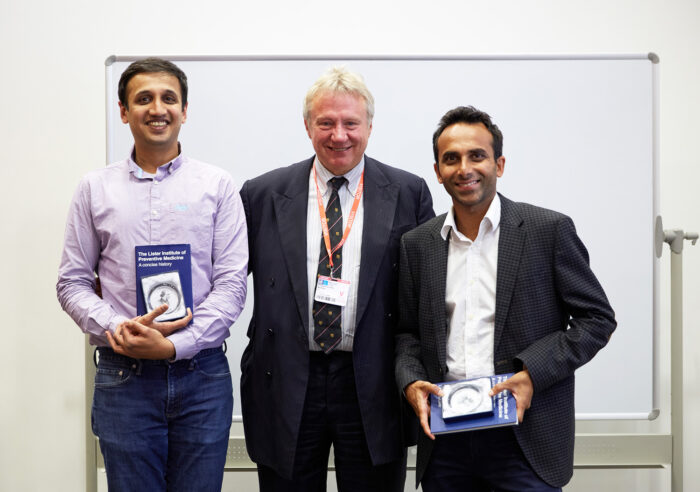Tanmay Bharat and Ravindra Gupta delivered lectures at the LMB, after both receiving the Lister Institute Research Prize last year

In 2021, the Lister Institute of Preventative Medicine recognised Tanmay Bharat, Group Leader in LMB’s Structural Studies Division, and Ravindra Gupta, Professor of Clinical Microbiology at the Cambridge Institute for Therapeutic Immunology and Infectious Diseases (CITIID) and faculty member at Africa Health Research Institute, with their prestigious Research Prizes. These prizes are awarded to researchers who are in the early years of running their own groups, and are open to applications from a wide range of researchers, with no restrictions on the subject area. Last year 6 awards were given from roughly 100 applicants. As part of the award, each winner is invited to deliver a lecture on their work. Their lectures are available to watch on our YouTube channel.
Tanmay Bharat
Tanmay Bharat is a Group Leader in the LMB’s Structural Studies Division, a position he has held since April 2022. Prior to this, Tanmay’s group was based at the Sir William Dunn School of Pathology, University of Oxford. He trained in Chemistry and then Biological Sciences and the University of Delhi and the University of Oxford respectively, and completed a PhD at EMBL Heidelberg. At the LMB, his group is focused on using electron tomography, alongside other structural and cell biology techniques, to study the surfaces of prokaryotic cells at the atomic level.
In his Lister Research Prize Lecture, Tanmay discussed recent research results from his group’s study of prokaryotic surfaces, and shared the potential for this knowledge to be applied for future biomedical impact. Whilst studying cell surface molecules is important for revealing fundamental information about bacteria and archaea, the potential clinical impact is also directly apparent. For instance, surface molecules allow pathogenic bacteria such as Pseudomonas aeruginosa – which can cause a wide range of infections, particularly in those with weakened immune systems – to evade antibiotics with biofilm formation. Biofilm formation, a key component of Tanmay’s research, is critical to a range of diseases and infections and an advanced, molecular understanding of them could aid the development of new therapeutic strategies.
Ravindra Gupta
Ravindra Gupta has been Professor of Clinical Microbiology at CITIID since 2019. He is also a Wellcome Senior Fellow in Clinical Science, and has frequently worked with the Africa Health Research Institute in Durban, South Africa. He completed undergraduate studies at the Universities of Cambridge and Oxford, and then went on to receive a Masters in Public Health from Harvard University. He trained in infectious diseases at the University of Oxford and the Hospital for Tropical Diseases, University College London Hospital, and completed his PhD on Lentiviral evasion of antiretrovirals and innate immune responses at UCL. He became a Group Leader at UCL in 2011, and was promoted to full professor in 2016. Ravindra is well known for his research on HIV drug resistance, at both the molecular and population levels. He led the team demonstrating HIV cure in the ‘London Patient’ – the world’s only living HIV cure, and the second recorded in history, a historic piece of research (Gupta et al, Nature 2019) for which Ravindra was named one of Time Magazine’s 100 most influential people of 2020.
During the COVID-19 pandemic Ravindra has deployed his expertise in RNA virus genetics and biology to report the first genotypic-phenotypic evidence for immune escape of SARS-CoV-2 within an individual, defining the process by which new variants likely arise, and also reporting some of the first data on Pfizer BioNTech vaccine-induced antibody responses against the B.1.1.7 Alpha variant that arose in the UK. More recently his work has defined the replication advantage of the Delta variant and the tropism shift and immune escape of Omicron.
In his Lister Research Prize Lecture, Ravindra discussed cell cycle regulation in macrophages and viral infection, specifically in HIV where virus reservoirs in macrophages help ensure viral persistence. He outlined his research findings that a significant proportion of tissue macrophages enter the G1 phase from G0 without progression through to S phase or division. These G1 macrophages are highly vulnerable to HIV-1 infection. Ravindra also discussed his ongoing research focusing on understanding why some macrophages are in G0 and other are in G1, how this could be manipulated, and the role conditions such as hypoxia have on macrophage progression.
Also present at the event was the Chairman of the Lister Institute, Professor Sir Alex Markham, who presented both awardees with medals. He also gave a brief history of the Lister Institute, which dates back to 1891, including the role of Edward Cecil Guinness, the 1st Earl of Iveagh, who was instrumental in funding the Lister Institute’s early years.
Further references
Structural biology of prokaryotic cell surfaces by Tanmay Bharat
Tanmay’s group page
Cell cycle regulation in macrophages and viral infection by Ravindra Gupta
Professor Ravindra Gupta
The Lister Institute of Preventative Medicine